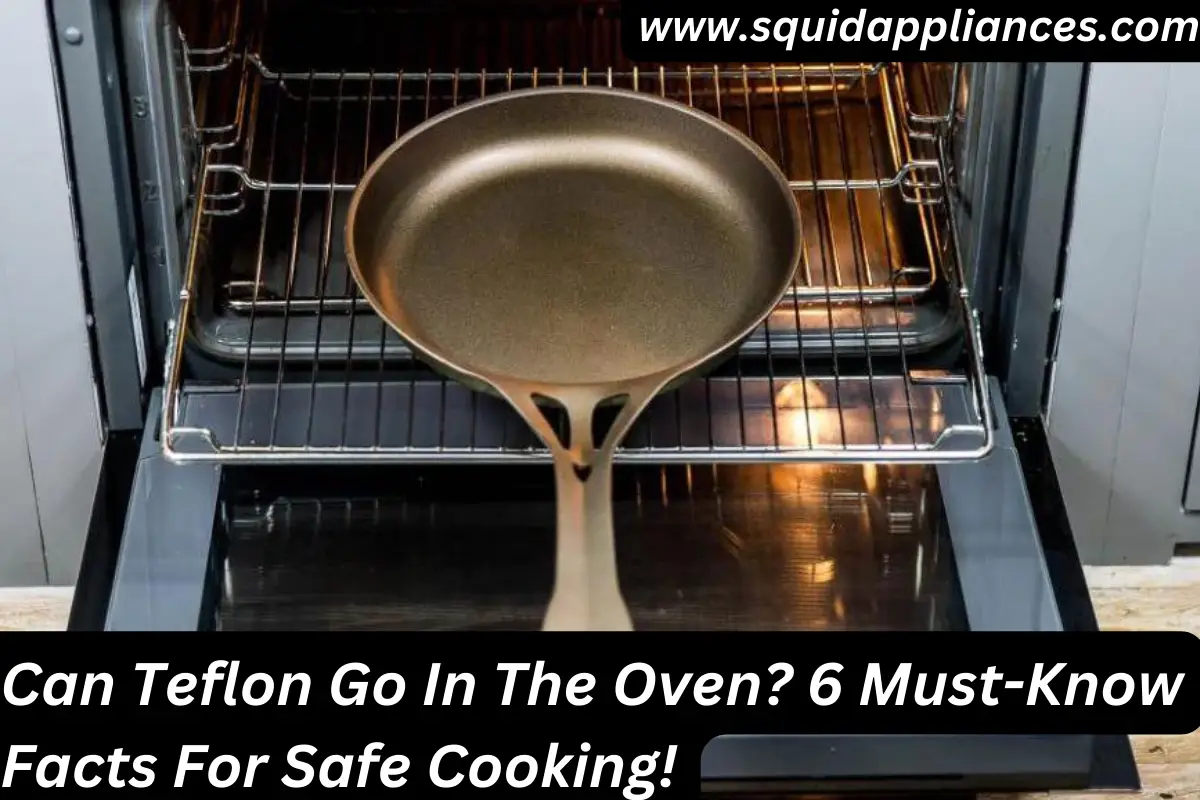Hey there! Have you ever wondered if it’s safe to use Teflon cookware in the oven? Well, I’ve got some must-know facts for you when it comes to cooking with Teflon in the oven.
Teflon is a popular non-stick coating that can make your cooking experience a breeze. But when it comes to high heat, things can get a little tricky. In this article, I’ll be diving into the heat resistance of Teflon and exploring some oven-safe alternatives.
Not only will I be sharing tips on how to properly care for and maintain your Teflon cookware, but I’ll also be highlighting common mistakes to avoid when using it in the oven. Safety is key!
So, if you’re looking for safe cooking practices with Teflon and want to explore other options for your oven dishes, keep reading! Together, we’ll ensure that your time in the kitchen is both enjoyable and worry-free.
Let’s get started!
Can Teflon Go In The Oven?
Yes, Teflon can go in the oven up to 500°F, but exceeding this risks releasing toxic fumes. Safer alternatives for high heat include cast iron, ceramic-coated stainless steel, and glass baking dishes. Proper care is crucial; avoid scratching, high heat, and metal utensils for worry-free Teflon cooking experiences.
Key Takeaways
- Teflon can withstand high temperatures in the oven up to 500 degrees Fahrenheit.
- Higher temperatures can cause the nonstick coating to break down and release toxic fumes.
- Cast iron pans and stainless steel pans with a ceramic coating are safe alternatives to Teflon for oven use.
- Glass baking dishes are also a safe option for high-temperature cooking.
Understanding Teflon’s Heat Resistance
Did you know that Teflon can withstand high temperatures in the oven? When it comes to using Teflon cookware, there are important safety precautions to keep in mind. While Teflon is heat resistant, it does have its limits.
It is recommended not to exceed temperatures of 500 degrees Fahrenheit when cooking with Teflon. Higher temperatures can cause the nonstick coating to break down and release toxic fumes into the air. Always prioritize your safety when cooking with Teflon!
Exploring Oven-Safe Alternatives to Teflon
Looking for a better option to use in your oven? Let’s explore some alternatives that are safe and can handle high temperatures.
When it comes to oven-safe cookware, there are plenty of nonstick alternatives available. Consider using cast iron pans or stainless steel pans with a ceramic coating. Both options provide excellent heat resistance and durability, making them perfect for baking and roasting.
Additionally, glass baking dishes are another great choice as they can withstand high temperatures without releasing any harmful chemicals.
Proper Care and Maintenance of Teflon Cookware
To ensure your cookware stays in excellent condition, it’s important to follow proper care and maintenance guidelines.
When cleaning Teflon cookware, avoid using abrasive materials or harsh chemicals that can damage the nonstick coating. Instead, use a soft sponge or cloth with mild dish soap and warm water.
Also, be careful not to use metal utensils that could scratch the Teflon surface.
With proper care, Teflon coatings can maintain their durability and provide long-lasting nonstick performance.
Common Mistakes to Avoid When Using Teflon in the Oven
Be cautious and avoid making the mistake of using Teflon cookware in your oven, as it can lead to disastrous consequences. Teflon is not designed to withstand high temperatures and can release toxic fumes when overheated.
This poses potential health risks to you and your family. To ensure safety, always use oven-safe cookware or opt for alternatives like stainless steel or cast iron when cooking at high temperatures.
| Mistakes to Avoid | ||
|---|---|---|
| Preheating empty Teflon pans | Using scratched Teflon cookware | Cooking with Teflon above 500°F |
| Placing Teflon under a broiler | Storing hot food in Teflon containers |
By avoiding these common mistakes, you can protect yourself from the dangers of overheating Teflon and reduce the potential health risks associated with its use in the oven.
Tips for Safe Cooking with Teflon
Make sure you follow these essential tips to ensure your cooking experience is worry-free and your meals turn out perfectly every time.
When it comes to teflon safety, it’s important to remember a few key points for cooking with nonstick pans. First, never use metal utensils that can scratch the surface of the teflon coating.
Second, avoid high heat settings as this can damage the pan.
Lastly, always hand wash your teflon cookware to maintain its integrity.
Frequently Asked Questions
What is the maximum temperature that Teflon can withstand in the oven?
The maximum temperature that Teflon can withstand in the oven is around 500 degrees Fahrenheit. Exceeding this temperature can lead to health hazards, as it may release toxic fumes and potentially cause polymer fume fever.
Can Teflon cause any health hazards if it gets heated above its recommended temperature?
Heating Teflon above its recommended temperature can release toxic fumes, causing potential health risks. To avoid this, consider using alternative cookware options such as stainless steel or cast iron, which are safe at higher temperatures.
Is it safe to use Teflon cookware in a self-cleaning oven?
It is not safe to use Teflon cookware in a self-cleaning oven. The high temperatures can damage the nonstick coating and release harmful fumes. Instead, consider using alternative oven-safe cookware options like stainless steel or cast iron.
Can Teflon coatings on bakeware release any harmful fumes when exposed to high temperatures?
Yes, teflon coatings on bakeware can release harmful fumes when exposed to high temperatures. These fumes can pose health hazards if inhaled. It is important to use caution and avoid overheating teflon-coated bakeware.
Are there any specific cleaning products or utensils that should be avoided when cleaning Teflon cookware?
There are certain cleaning products and utensils that should be avoided when cleaning Teflon cookware. Abrasive cleaners and metal utensils can damage the nonstick coating, so it’s best to use gentle cleaners and soft utensils.
Conclusion
In conclusion, it’s crucial to understand that Teflon shouldn’t be used in the oven due to its limited heat resistance. It’s important to prioritize safety when cooking and choose oven-safe alternatives like ceramic or stainless steel cookware.
Proper care and maintenance of Teflon cookware can also help extend its longevity and performance. By avoiding common mistakes and following these tips, you can ensure safe cooking with Teflon and enjoy delicious meals without any health risks.






